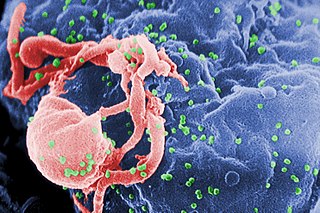Related Research Articles

Severe acute respiratory syndrome (SARS) is a viral respiratory disease of zoonotic origin caused by the virus SARS-CoV-1, the first identified strain of the SARS-related coronavirus. The first known cases occurred in November 2002, and the syndrome caused the 2002–2004 SARS outbreak. In the 2010s, Chinese scientists traced the virus through the intermediary of Asian palm civets to cave-dwelling horseshoe bats in Xiyang Yi Ethnic Township, Yunnan.

The 1918–1920 flu pandemic, also known as the Great Influenza epidemic or by the common misnomer Spanish flu, was an exceptionally deadly global influenza pandemic caused by the H1N1 influenza A virus. The earliest documented case was March 1918 in the state of Kansas in the United States, with further cases recorded in France, Germany and the United Kingdom in April. Two years later, nearly a third of the global population, or an estimated 500 million people, had been infected in four successive waves. Estimates of deaths range from 17 million to 50 million, and possibly as high as 100 million, making it one of the deadliest pandemics in history.

AIDS is caused by a human immunodeficiency virus (HIV), which originated in non-human primates in Central and West Africa. While various sub-groups of the virus acquired human infectivity at different times, the present pandemic had its origins in the emergence of one specific strain – HIV-1 subgroup M – in Léopoldville in the Belgian Congo in the 1920s.

The 2009 swine flu pandemic, caused by the H1N1/swine flu/influenza virus and declared by the World Health Organization (WHO) from June 2009 to August 2010, was the third recent flu pandemic involving the H1N1 virus. The first identified human case was in La Gloria, Mexico, a rural town in Veracruz. The virus appeared to be a new strain of H1N1 that resulted from a previous triple reassortment of bird, swine, and human flu viruses which further combined with a Eurasian pig flu virus, leading to the term "swine flu".

The 2013–2016 epidemic of Ebola virus disease, centered in Western Africa, was the most widespread outbreak of the disease in history. It caused major loss of life and socioeconomic disruption in the region, mainly in Guinea, Liberia and Sierra Leone. The first cases were recorded in Guinea in December 2013; later, the disease spread to neighbouring Liberia and Sierra Leone, with minor outbreaks occurring in Nigeria and Mali. Secondary infections of medical workers occurred in the United States and Spain. In addition, isolated cases were recorded in Senegal, the United Kingdom and Italy. The number of cases peaked in October 2014 and then began to decline gradually, following the commitment of substantial international resources.
Martin T. Schechter is a Canadian epidemiologist recognized for contributions to research about HIV prevention and treatments, addiction research, and Indigenous health research. He is a professor and was the founding director of the School of Population and Public Health in the Faculty of Medicine at the University of British Columbia (UBC). Schechter received his Order of British Columbia in 1994 alongside BC's first Nobel Prize laureate Michael Smith and noted Indigenous artist Bill Reid. In 2022, Schechter was named as a Member of the Order of Canada.

ZMapp is an experimental biopharmaceutical drug comprising three chimeric monoclonal antibodies under development as a treatment for Ebola virus disease. Two of the three components were originally developed at the Public Health Agency of Canada's National Microbiology Laboratory (NML), and the third at the U.S. Army Medical Research Institute of Infectious Diseases; the cocktail was optimized by Gary Kobinger, a research scientist at the NML and underwent further development under license by Mapp Biopharmaceutical. ZMapp was first used on humans during the Western African Ebola virus epidemic, having only been previously tested on animals and not yet subjected to a randomized controlled trial. The National Institutes of Health (NIH) ran a clinical trial starting in January 2015 with subjects from Sierra Leone, Guinea, and Liberia aiming to enroll 200 people, but the epidemic waned and the trial closed early, leaving it too statistically underpowered to give a meaningful result about whether ZMapp worked.

An Ebola virus epidemic in Sierra Leone occurred in 2014, along with the neighbouring countries of Guinea and Liberia. At the time it was discovered, it was thought that Ebola virus was not endemic to Sierra Leone or to the West African region and that the epidemic represented the first time the virus was discovered there. However, US researchers pointed to lab samples used for Lassa fever testing to suggest that Ebola had been in Sierra Leone as early as 2006.

An epidemic of Ebola virus disease in Guinea from 2013 to 2016 represents the first ever outbreak of Ebola in a West African country. Previous outbreaks have been confined to several countries in Sub-Saharan Africa.

Four laboratory-confirmed cases of Ebola virus disease occurred in the United States in 2014. Eleven cases were reported, including these four cases and seven cases medically evacuated from other countries. The first was reported in September 2014. Nine of the people contracted the disease outside the US and traveled into the country, either as regular airline passengers or as medical evacuees; of those nine, two died. Two people contracted Ebola in the United States. Both were nurses who treated an Ebola patient; both recovered.

Organizations from around the world responded to the West African Ebola virus epidemic. In July 2014, the World Health Organization (WHO) convened an emergency meeting with health ministers from eleven countries and announced collaboration on a strategy to co-ordinate technical support to combat the epidemic. In August, they declared the outbreak an international public health emergency and published a roadmap to guide and coordinate the international response to the outbreak, aiming to stop ongoing Ebola transmission worldwide within 6–9 months. In September, the United Nations Security Council declared the Ebola virus outbreak in the West Africa subregion a "threat to international peace and security" and unanimously adopted a resolution urging UN member states to provide more resources to fight the outbreak; the WHO stated that the cost for combating the epidemic will be a minimum of $1 billion.

Cases of the Ebola virus disease in Nigeria were reported in 2014 as a small part of the epidemic of Ebola virus disease which originated in Guinea that represented the first outbreak of the disease in a West African country. Previous outbreaks had been confined to countries in Central Africa.

The Coalition for Epidemic Preparedness Innovations (CEPI) is a foundation that takes donations from public, private, philanthropic, and civil society organisations, to finance independent research projects to develop vaccines against emerging infectious diseases (EID).

In the United States, the opioid epidemic is an extensive, ongoing overuse of opioid medications, both from medical prescriptions and illegal sources. The epidemic began in the United States in the late 1990s, according to the Centers for Disease Control and Prevention (CDC), when opioids were increasingly prescribed for pain management, resulting in a rise in overall opioid use throughout subsequent years. The great majority of Americans who use prescription opioids do not believe that they are misusing them.

Disease X is a placeholder name that was adopted by the World Health Organization (WHO) in February 2018 on their shortlist of blueprint priority diseases to represent a hypothetical, unknown pathogen that could cause a future epidemic. The WHO adopted the placeholder name to ensure that their planning was sufficiently flexible to adapt to an unknown pathogen. Director of the US National Institute of Allergy and Infectious Diseases Anthony Fauci stated that the concept of Disease X would encourage WHO projects to focus their research efforts on entire classes of viruses, instead of just individual strains, thus improving WHO capability to respond to unforeseen strains. In 2020, experts, including some of the WHO's own expert advisors, speculated that COVID-19, caused by the SARS-CoV-2 virus strain, met the requirements to be the first Disease X.

The opioid epidemic, also referred to as the opioid crisis, is the rapid increase in the overuse, misuse/abuse, and overdose deaths attributed either in part or in whole to the class of drugs called opiates/opioids since the 1990s. It includes the significant medical, social, psychological, demographic and economic consequences of the medical, non-medical, and recreational abuse of these medications.
Daniel R. Lucey is an American physician, researcher, senior scholar and adjunct professor of infectious diseases at Georgetown University, and a research associate in anthropology at the Smithsonian National Museum of Natural History, where he has co-organised an exhibition on eight viral outbreaks.
Trudie Lang is a Professor of Global Health Research at the University of Oxford. She specialises in clinical trials research capacity building in low-resource setting, and helped to organise the trial for the drug brincidofovir during the 2014 Ebola virus outbreak.

Rahul Gupta is an American physician from the state of West Virginia. In 2021, he was appointed to serve as director of the Office of National Drug Control Policy by President Joe Biden. He formerly served at the helm of the West Virginia Bureau for Public Health.
References
- ↑ "Remembering the life of Nicholas Regush". montrealgazette.remembering.ca.
- ↑ "Regush, Nicholas M." QWF Literary Database of Quebec English-Language Authors.
- ↑ "ABC News Producer Nicholas Regush Dies". ABC News.
- ↑ Csillag, Ron (15 November 2004). "NICHOLAS REGUSH, WRITER: 1946-2004". The Globe and Mail. p. S.9. ProQuest 383727604.
- ↑ "The Drug Addiction Business By Nicholas M. Regush. 141 pp. Dial. $9.95". The New York Times. March 12, 1972 – via NYTimes.com.
- ↑ "Star-Phoenix from Saskatoon, Saskatchewan, Canada". Newspapers.com. November 21, 1987.
- ↑ "The Virus within: A Coming Epidemic by Nicholas Regush".